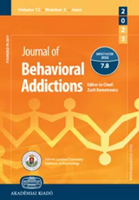On the current psychotherapeutic situation for persons with pornography use disorder in Germany
On the current psychotherapeutic situation for persons with pornography use disorder in Germany
Author(s): Charlotte Markert, Florian Storz, Sarah Golder, Johanna Rechmann, Julian A. Rubel, Christopher Lalk, Rabea Vogt, Julia A. Glombiewski, David Braun, Christiane A. Pané-Farré, Tanja Michael, Hannah K. Mattheus, Nanne Dominick, Klaus Wölfling, Wolfgang Lutz, Jana Schaffrath, Ulrich Stangier, Schahryar Kananian, Dirk Strüwing, Doerthe Klingelhöfer, Frederik Valbert, Anja Neumann, Bertram Walter, Rudolf StarkSubject(s): Individual Psychology, Clinical psychology, Behaviorism, Substance abuse and addiction, Health and medicine and law
Published by: Akadémiai Kiadó
Keywords: behavioral addiction; compulsive sexual behavior disorder; problematic pornography use; pornography use disorder; prevalence rate;
Summary/Abstract: Background and aims: For the first time, the ICD-11 provides the diagnosis compulsive sexual behavior disorder (CSBD) that can be assigned for pornography use disorder (PUD). This study aimed to estimate the prevalence of PUD and associated consequences in Germany, to identify the psychotherapy demand among likely PUD (lPUD) cases and the treatment supply in different psychotherapeutic settings, to survey psychotherapists’ level of expertise regarding PUD, and to identify predictors for psychotherapy demand. Methods: Four studies were conducted: 1. Online study in the general population (n 5 2070; m 5 48.9%, f 5 50.8%, d 5 0.2%), 2. Survey among practicing psychotherapists (n 5 983), 3. Survey of psychotherapists in psychotherapeutic outpatient clinics (n 5 185), 4. Interviews with psychotherapeutic inpatient clinics (n 5 28). Results: The estimated prevalence of lPUD in the online study was 4.7% and men were 6.3 times more often affected than women. Compared to individuals without PUD, individuals with lPUD more often indicated negative consequences in performance-related areas. Among lPUD cases, 51.2% of men and 64.3% of women were interested in a specialized PUD treatment. Psychotherapists reported 1.2%–2.9% of lPUD cases among their patients. 43.2%–61.5% of psychotherapists stated to be poorly informed about PUD. Only 7% of psychotherapeutic inpatient clinics provided specific treatments to patients with PUD. While, among other factors, negative consequences attributed to lPUD were predictive for psychotherapy demand, weekly pornography consumption, subjective well-being, and religious attachment were not. Discussion and conclusions: Although PUD occurs quite often in Germany, availability of mental health care services for PUD is poor. Specific PUD treatments are urgently needed.
Journal: Journal of Behavioral Addictions
- Issue Year: 12/2023
- Issue No: 2
- Page Range: 421-434
- Page Count: 14
- Language: English

